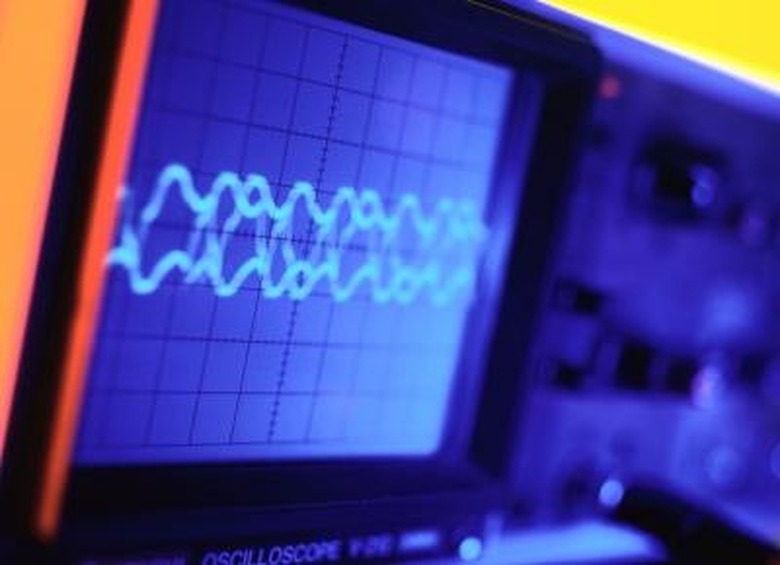Uses Of The Oscilloscope
An oscilloscope is a diagnostic device that displays a time varying voltage. Like a television, it features a cathode ray tube, which produces an electron beam that sweeps across a fluorescent screen. It is significant because it shows electrical signals in the form of voltage versus time.
Significance
Significance
The oscilloscope is useful because it allows electrical signals, especially time varying ones, to be observed. The signals may be slow moving or rapid. The oscilloscope has amplification and delay features that allow part or all of the signal to be observed. Other features allow the signals to be physically moved about the screen. All of this makes it easier for the signal to be measured.
Cathode Ray Tube
Cathode Ray Tube
The heart of an oscilloscope is the cathode ray tube (CRT). A CRT has several basic parts: an electron gun, vertical deflection plates or coils, horizontal deflection plates or coils and an electron beam.
Electron Gun
Electron Gun
The electron gun consists of a heater, a cathode and an anode. The cathode is the negative electrode, and the anode is the positive one. An electric current causes the heater to heat the cathode. This temperature increase forces electrons to flow from it to the anode. This process is called "boiling off " the electrons.
Operation
Operation
The anode has a small hole in it, and a high voltage that can range from 5 kV to 50 kV. Electrons from the cathode pass through the small hole, while simultaneously being accelerated by the high voltage. After passage, the electrons are deflected by the vertical plates and horizontal plates that have a time varying voltage deliberately applied to them. The vertical plates deflect the electrons horizontally, and the horizontal plates deflect the electrons vertically. In some oscilloscopes, magnetic deflection coils are substituted for the plates.
The deflected electron beam strikes a screen, which is coated with phosphorus. This screen subsequently emits visible light in the form of a dot. The location of the electron beam on the screen depends on the amount of the voltages that are applied to the deflection plates. The beam sweeps across the screen because of the horizontal deflection applied by the vertical plates. The reason you don't only see a dot moving across the screen is because of the phosphorus, which causes you to see lines.
Uses
Uses
Oscilloscopes are used to view the signals coming directly from devices such as sound cards, allowing the real-time display of waves. They are used as electrocardiograms, to test circuits and to troubleshoot electronic devices such as televisions. Oscilloscopes with storage features allow signals to be captured, retrieved and analyzed for later use.
Cite This Article
MLA
Lewis, Kim. "Uses Of The Oscilloscope" sciencing.com, https://www.sciencing.com/uses-oscilloscope-5348699/. 24 April 2017.
APA
Lewis, Kim. (2017, April 24). Uses Of The Oscilloscope. sciencing.com. Retrieved from https://www.sciencing.com/uses-oscilloscope-5348699/
Chicago
Lewis, Kim. Uses Of The Oscilloscope last modified March 24, 2022. https://www.sciencing.com/uses-oscilloscope-5348699/
